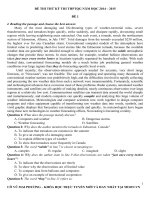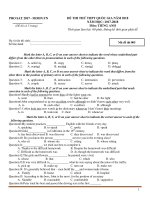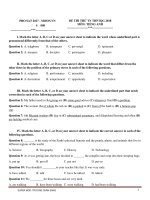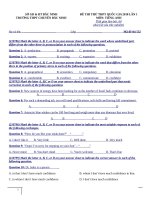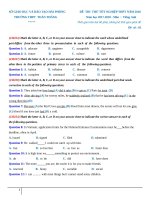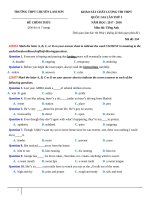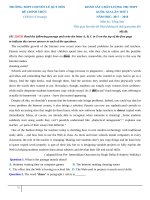12 đề thi thử tiếng anh năm 2018 – cô mai phương đề số (2)
Bạn đang xem bản rút gọn của tài liệu. Xem và tải ngay bản đầy đủ của tài liệu tại đây (436.54 KB, 13 trang )
ĐỀ THI THỬ THPT QUỐC GIA NĂM 2018
NĂM HỌC: 2017-2018
Môn: TIẾNG ANH
Thời gian làm bài: 60 phút, không kể thời gian phát đề
PRO SAT 2017 - MOON.VN
CÔ C
(Đề thi có 5 trang)
Họ và tên thí sinh:.....................................................................
Số báo danh
:.....................................................................
Mã đề thi 005
Mark the letter A, B, C, or D on your answer sheet to indicate the word whose underlined part
differs from the other three in pronunciation in each of the following questions.
Question 1:
Question 2:
A. achieves
A. wanted
B. stops
B. needed
C. draws
C. started
D. plans
D. obliged
Mark the letter A, B, C, or D on your answer sheet to indicate the word that differs from the
other three in the position of primary stress in each of the following questions.
Question 3:
Question 4:
A. application
A. couple
B. interaction
B. secure
C. internation
C. across
D. prevention
D. attack
Mark the letter A ,B ,C ,or D on your answer sheet to indicate the underlined part that needs
correction in each of the following questions.
Question5:Hardly had he entered the room than all the lights went out.
A. went
B. than
C. had he enter
D. the light
Question6:John congratulated us to our excellent results although we didn’t know each other very well.
A. to
B. each other
C. excellent
D. although
Question7: I often look into new words in the dictionary whenever I don’t know their meanings.
A. in
B. look into C. their
D. whenever
Mark the letter A, B, C, or D on your answer sheet to indicate the correct answer to each of the
following questions.
Question8:My student practices_____________ English with her friends every day.
A. speaking
B. to speak
C. spoke
D. speak
Question9:Gold_____________ in California in the 19th century.
A. has been discovered B. was discover
C. they discovered
D. was discovered
Question10: Do you know the person_____________ next to you in the evening class?
A. who sit
B. whom sits
C. sitting
D. whose sitting
Question11:_____________, we tried our best to complete it.
A. Thanks to the difficult homework
B. Despite the homework was difficult
C. Difficult as the homework was
D. As though the homework was difficult
Question12:The girls and flowers_____________ he painted were vivid.
A. whose
B. that
C. which
D. who
Question13:It was very difficult to_____________ what he was saying about the noise of the traffic.
A. pick up
B. make up
C. turn out
D. make out
Question14: It’s generally believed that – men build the
and women make it home
A. Family
B. house
C. school
D. hospital
Question15: According to the boss, John is the most for the position of secretary
A. Suitable
B. reasonable
C. comfortable
D. supportive
Question16:Peter tried his best and passed the driving test at the first _______.
1
A. try
B. attempt
C. doing
D. aim
Question17:Whenever problems come up, we discuss them frankly and find solutions quickly.
A. happen
B. encounter
C. arrive
D. clean
Question18:―Each of us must take ______ for our own actions.
A. probability
B. ability
C. possibility
D. responsibility
Question19:What are the _______ of that country? - I think it is some kinds of cheese and sauces.
A. drinks
B. beverages
C. grains
D. special dishes
Mark the letter A ,B ,C ,or D on your answer sheet to indicate the most suitable response to
complete each of the following exchanges.
Question20: “Make yourself at home!”
- John: “ _________________________”
A. Thanks! Same to you
B. That’s very kind. Thank you
C. Not at all. Don’t mention it
D. Yes, Can I help you?
Question21: - “Are you coming for a drink?”
– “______________. I must get this finished tonight.”
A. Thanks, but I mustn’t
C. As a matter of fact, I do
B.Can I take a rain check
D. Well, that’s very surprising
Mark the letter A, B, C, or D on your answer sheet to indicate theword(s) CLOSEST in meaning
to the underlined word(s) in each of the following questions.
Question22: Punctuality is imperative in your new job.
A. Being efficient
B. Being courteous C. Being on time
D. Being cheerful
Question23: It is imperative that they finish the task on time.
A. unnecessary
B. necessary
C. suggested
D. hoped
Mark th eletter A, B, C, or D on your answer sheet to indicate theword(s) OPPOSITE in
meaning to the underlined word(s) in each of the following questions.
Question24: The Red Cross is an international humanitarian agency dedicated to reducing the sufferings of
wounded soldiers, civilians and prisoners of war.
A. happiness
B. worry and sadness C. pain and sorrow
D. loss
Question25:She was unhappy that she lost contact with a lot of her old friends when she went abroad to study.
A. made room for
B. put in charge of
C. lost control of
D. got in touch with
Mark the letter A, B, C, or D on your answer sheet to indicate the sentence that is closest in
meaning to each of the following questions.
Question26:Their dog was so fierce that nobody would visit them.
A. Their dog was too fierce to visit.
B. They had so fierce a dog that nobody would visit them.
C. They had a such fierce dog that nobody would visit them.
D. They had a so fierce dog that nobody would visit them.
Question27:My mother had the house decorated.
A. The house was decorated by my mother. B. My mother had someone decorate the house.
C. My mother had to decorate the house.
D. My mother has just decorated the house.
Question28:Nobody at all came to the meeting.
A. Not many people came to the meeting. B. Not a single person came to the meeting.
C. There was almost nobody at the meeting. D. Only a few people came to the meeting.
Mark the letter A, B, C, or D on your answer sheet to indicate the sentence that best combines
each pair of sentences in the following questions.
Question29:The holiday was so expensive. We could only afford five days.
A. It was such an expensive holiday that we could only afford five days.
B. The holiday was dirt cheap, so we could afford more than five days.
2
C. So expensive was a five-day holiday that we could hardly afford it.
D. A five-day holiday wasn’t cheap, so we couldn’t afford it.
Question30:The basketball team knew they lost the match. They soon started to blame each other.
A. As soon as they blamed each other, the basketball team knew they lost the match.
B. No sooner had the basketball team started to blame each other than they knew they lost the
match.
C. Not only did the basketball team lose the match but they blamed each other as well.
D. Hardly had the basketball team known they lost the match when they started to blame each
other.
Read the following passage and mark the letter A, B, C, or D on your answer sheet to indicate
the correct word or phrase that best fits each of the numbered blanks from 6 to 10.
Many people today would like the traditional two-parent family back, that is to say, they want a man and a
woman to (31)______ for life; they also think the man should support the family and the woman should stay
home with the children. However, few families now (32)______ into this category. In fact, if more women
decide to have children on their own, the single-parent household may become more typical than the traditional
family in many countries. Also, unmarried couples may decide to have more children – or they might take in
foster children or (33)______. And because people are staying single and living longer (often as widows), there
may be more one-person households. (34)______ the other hand, some people believe similar events happen
again and again in history: if this is true, people may go back to the traditional (35)_____ or nuclear family of
the past. Others think the only certainty in history is change: in other words, the structure of the future family
could begin to change faster and faster and in more and more ways.
Question 31:
Question 32:
Question 33:
Question 34:
Question 35:
A. marry
A. belong
A. bring up
A. In
A. extended
B. wed
B. crowd
B. feel
B. At
B. extensive
C. engage
C. group
C. adapt
C. On
C. enlarged
D. gather
D. fall
D. adopt
D. For
D. big
Read the following passage and mark the letter A, B, C,or D on your answer sheet to indicate
the correct answer to each of the questions from 36 to 42.
The Nobel prizes, awarded annually for distinguished work in chemistry, physic, physiology or
medicine, literature, and international peace, were made available by a fund bequeathed for that purpose by
Swedish philanthropist, Alfred Bernard Nobel. The prizes, awarded since 1901, are administered by the Nobel
Foundation in Stockholm. In 1969, a prize for economics endowed by the Central Bank of Sweden was added.
Candidates for the prizes must be nominated in writing by a qualified authority in the field of competition.
Candidates are judged by Swedish and Norwegian academies and institutes on the basis of their contribution to
mankind. The awards are usually presented in Stockholm ion December 10, with the King of Sweden
officiating, an appropriate tribute to Alfred Nobel on the anniversary of his death. Each prize includes a gold
medal, a diploma, and a cash award of about one million dollars.
Question 36.Why are the awards presented on December 10?
A. Because that date was established Nobel’s will.
B. Because Alfred Nobel died on that day.
C. Because it is a tribute to the King of Sweden.
D. Because Central Bank of Sweden administers the trust.
Question 37.Why were the prizes named for Alfred Nobel?
A. He left money in his will to establish a fund for the prizes.
B. He is now living in Sweden.
3
C. He serves as chairman of committee to choose the recipients of the prizes.
D. He won the first Nobel prize for his work in philanthropy.
Question 38.What does this passage mainly discussed?
A. Alfred Bernard Nobel.
B. Great contributions to mankind.
C. Swedish philanthropy.
D. The Nobel prizes.
Question 39.How often are the Nobel prizes awarded?
A. Once a year
B. Twice a year
C. Five times a year D. Once every two year
Question 40.A Nobel prize would NOT be given to _______.
A. a doctor who discovered a vaccine
B. a composer who wrote a symphony
C. an author who wrote a novel
D. a diplomat who negotiated a peace settlement
Read the following passage and mark the letter A, B, C,or D on your answer sheet to indicate the
correct answer to each of the questions from 43 to 50.
The goal of Internet-based encyclopedia Wikipedia (www.wikipedia.org) is to give everyone on the
planet access to information. Like other encyclopedias, Wikipedia contains lots of information: more than 2.5
million articles in 200 different languages covering just about every subject. Unlike other encyclopedias,
however, Wikepedia is not written by experts, but by ordinary people. These writers are not paid and their
names are not published. They contribute to Wikipedia simply because they want to share their knowledge.
Encyclopedias began in ancient times as collections of writings about all aspects of human knowledge.
The word itself comes from ancient Greek, and means “a complete general education”. Real popularity for
encyclopedias came in the nineteenth century in Europe and the United States, with the publication of
encyclopedias written for ordinary readers. With the invention of the CD-ROM, the same amount of
information could be put on a few computer discs. Then with the Internet, it became possible to create an online
encyclopedia that could be constantly updated, like Microsoft’s Encarta. However, even Internet-based
encyclopedias like Encarta were written by paid experts. At first, Wikipedia, the brainchild of Jimmy Wales, a
businessman in Chicago, was not so different from these. In 2001, he had the idea for an Internet-based
encyclopedia that would provide information quickly and easily to everyone. Furthermore, that information
would be available free, unlike other Internet encyclopedias at that time.
But Wales, like everyone else, believed that people with special knowledge were needed to write the
articles, and so he began by hiring experts. He soon changed his approach, however, as it took them a long time
to finish their work. He decided to open up the encyclopedia in a radical new way, so that everyone would have
access not only to the information, but also to the process of putting this information online. To do this, he used
what is known as “Wiki” software (from the Hawaiian word for “fast”), which allows users to create or alter
content on web page. The system is very simple: When you open the web site, you can simply search for
information or you can log on to become a writer or editor of articles. If you find an article that interests you –
about your hometown, for example – you can correct it or expand it. This process goes on until no one is
interested in making any more changes.
Question 41: Wikipedia is written by_________.
A. paid written
B. millionaires
C. normal people
D. world experts
Question 42: The phrase “these writers” in the first paragraph refers to____.
A. ordinary readers
B. ordinary people C. encyclopedia experts D. every subject
Question 43: The phrase “the word” in the second paragraph refers to_________.
A. knowledge
B. encyclopedia
C. writing
D. collection
Question 44: Microsoft’s Encarta is cited in the passage as an example of_________.
A. CD-ROM dictionary
B. printed encyclopedia
C. online encyclopedia
D. updateable online encyclopedia
Question 45: The word “brainchild” in the second paragraph of the passage can be best replaced by________.
A. born
B. child
C. product
D. father
Question 46: The word “approach” in the third paragraph of the passage means_________.
4
A. idea
B. time
C. method
D. writing
Question 47: The user of Wikipedia can do all of the following EXCEPT_________.
A. have access to information
B. determinate the website
C. modify information
D. edit information
Question 48: We can say that Jimmy Wales_________.
A. became very famous after the formation of Wikipedia
B. is the father of Wikipedia
C. made a great profit from Wikipedia
D. decides who can use Wikipedia
Question 49: Wiki software enables_________.
A. exchanging articles
B. a purchase of information
C. limited access
D. editing
Question 50: Wikipedia is a(n)_________.
A. book
B. journal
C. article
D. dictionary
------------------THE END-----------------
5
HƯỚNG DẪN GIẢI CHI TIẾT
1B
11C
21B
31A
41C
2D
12B
22C
32D
42B
3D
13D
23B
33D
43B
4A
14B
24A
34C
44D
5B
15A
25D
35A
45C
6A
16B
26B
36B
46C
7B
17A
27B
37A
47B
8A
18D
28B
38D
48B
9D
19D
29A
39A
49D
10C
20B
30D
40B
50B
1. B
A. Achieves /ə'tʃi:vz/
B. Stops /stɔps/
C. Draws /drɔ:z/
D. Plans /plænz/
Cách phát âm đuôi “-s” và “-es”
• /s/: tận cùng là âm vô thanh [f,k,p,t,θ]
VD: chefs, kicks, claps, hits, paths /pɑ ː θs/
• /s/: tận cùng là [p,pe,f,fe,gh,ph,t,te,k,ke]
VD: claps, hopes, laughs/ lɑ ː fs/, photographs, hats, hates, kicks, lakes,…
• /iz/: tận cùng là [s,ʃ, tʃ, z, dʒ]
VD: buses, washes, catches, buzzes, judges,…
• /iz/: tận cùng là [s,x,ch,sh,ce,se,ge]
VD: classes, boxes, watches, voices, horses, pages,…
• /z/: tận cùng là các phụ âm còn lại – phụ âm hữu thanh [b, d, g,l, m, n, r, v, ð] sau các nguyên âm
VD: rubs, cards, eggs, walls, names, cleans, wears, lives, clothes, tries /traiz/, toys / toiz/,…
2. D
A. Wanted /wɔntid/
B. Needed /ni:did/
C. Started /stɑ:tid/
D. Obliged /ə'blaiʤd/
Cách phát âm đuôi “ed”
• /t/: tận cùng là âm vô thanh [f,k,p,t,θ, ʃ,tʃ ]
Ví dụ: watched, looked, stopped, worked, placed, passed,...
• /id/: tận cùng là [t,d], đặc biệt: động từ dạng V_ed được dùng như tính từ (wicked, aged,...)
Ví dụ: needed, wanted, decided, waited, edited, ...
• /d/: tận cùng là âm hữu thanh gồm các phụ âm còn lại và nguyên âm.
Ví dụ: lived, played, studied, filled, cleaned, followed, called, prepared,...
3. D
A. Application /æpli'keiʃn/
B. Interaction / intər'ækʃn/
C. International /intə'næʃənl/
D. Prevention /pri'venʃn/
6
Trọng âm chính rơi vào vào âm tiết đứng trước các hậu tố: tion, sion, ance, ence, ience, iar, ior, ics,
ic, ity, ory.
Trọng âm chính rơi vào vào âm tiết đứng thứ ba từ dười lên khi có các hậu tố: al.
4. A
A. Couple /'kʌpl/
B. Secure /si'kjuə/
C. Across /ə'krɔs/
D. Attack /ə'tæk/
Trọng âm của từ có 2 âm tiết, thường rơi vào âm tiết thứ nhất nếu từ đó là danh từ, tính từ; rơi vào
âm tiết thứ 2 nếu từ đó là động từ.
5. B
Than => when
Chủ điểm ngữ pháp: đảo ngữ
Hardly +had + S + V(P2) + when + S+V(P1)
Ngay khi anh ấy bước vào căn phòng, tất cả ánh sáng vụt tắt.
6. A
To => for
Congratulate +sb+ on+ sth: chúc mừng ai đó về việc gì.
John chúc mừng chúng tôi vì những kết quả rất tuyệt vời mặc dù chúng tôi đã không biết rõ những
người còn lại.
7. B
Look into => look up
Look into: xem xét kỹ, look up: tìm kiếm, tra (từ điển)
Tôi thường tra từ mới trong từ điển bất cứ khi nào tôi không biết nghĩa của chúng.
8. A
Practice+ V_ing: thực hành việc gì.
Học sinh của tôi thực hành nói tiếng Anh với các bạn của cô ấy mỗi ngày.
9. D
Chủ điểm ngữ pháp: câu bị động
S+was/were+ V(P2)+...: bị động với thì quá khứ đơn
Vàng được phát hiện ở California vào thế kỷ 19.
10. C
Chủ điểm ngữ pháp: mệnh đề quan hệ
Mệnh đề quan hệ dạng chủ động => V_ing
Do you know the person [who sits/sitting] next to you in the evening class?
11. C
Chủ điểm ngữ pháp: cấu trúc câu nhấn mạnh với tính từ
However adj/adv + SV, SV = Adj as SV, SV: mặc dù.... đến thế nào nhưng...
Mặc dù bài tập về nhà rất khó, chúng tôi đã cố gắng hết sức để hoàn thành nó.
12. B
Chủ điểm ngữ pháp: mệnh đề quan hệ
“That” là đại từ quan hệ duy nhất thay thế được cho cả chủ ngữ người và vật.
Những cô gái và bông hoa anh ấy vẽ thật sống động.
7
13. D
A. Pick up: tăng lên
B. Make up: bổ sung
C. Turn out: tụ tập, có mặt
D. Make out: hiểu được
Thật khó để hiểu được những gì anh ấy đã nói về tiếng ồn giao thông.
14. B
Men build the house and women make it home: đàn ông xây nhà, đàn bà xây tổ ấm
Có niềm tin phổ biến là đàn ông xây nhà, đàn bà xây tổ ấm.
15. A
A. Suitable: thích hợp
B. Reasonable: hợp lý
C. Comfortable: thoải mái
D. Supportive: ủng hộ
Theo giám đốc, John là người thích hợp nhất cho vị trí thư ký.
16. B
At the first attempt: ở cố gắng đầu tiên
Peter đã cố gắng hết sức mình và vượt qua bài kiểm tra lái xe ngay từ lần đầu tiên.
17. A
Come up= happen: xảy ra
Mỗi khi vấn đề xảy ra, chúng tôi thảo luận một cách thẳng thắn và nhanh chóng tìm ra giải pháp.
18. D
Take responsibility for sth:chịu trách nhiệm cho
Mỗi người trong chúng ta phải chịu trách nhiệm cho hành động của mình.
19. D
Special dishes: món đặc sản
Các món đặc sản của đất nước đó là gì? – Tôi nghĩ đó là một số loại phomat và nước sốt.
20. B
“Cứ tự nhiên như ở nhà nhé.” – John: “_____”
A. Cảm ơn, bạn cũng vậy.
B. Bạn thật tốt bụng, cảm ơn.
C. Không có gì. Đừng đề cập đến nó.
D. Vâng, tôi có thể giúp gì bạn không?
21. B
“Bạn có định đi uống chút gì không?” – “_____”
A. Cảm ơn, nhưng tôi không được phép.
B. Tôi có thể lần sau được không (dùng khi không thê lời mời bây giờ nhưng sẽ đi vào lần sau)
C. Thực tế là, tôi có. (trái ngược với điều từng xảy ra trước đó)
D. Ồ, thật ngạc nhiên.
22. C
Punctuality(n): sự đúng giờ
A. Being efficient: Hiệu quả
B. Being courteous: Lịch sự
8
C. Being on time: Đúng giờ
D. Being cheerful :Tươi cười
Đúng giờ rất quan trọng trong công việc mới của bạn.
23. B
Imperative(adj): quan trọng
A. Unnecessary: Không cần thiết
B. Necessary: Cần thiết
C. Suggested: Gợi ý
D. Hoped: Hi vọng
Việc họ hoàn thành công việc đúng giờ là rất quan trọng.
24. A
Suffering(n): sự đau đớn, đau khổ
A. Happiness: hạnh phúc
B. worry and sadness: Lo lắng và buồn thương
C. pain and sorrow: nỗi đau và sự bất hạnh
D. loss: sự mất mát
Red Cross là một tổ chức nhân đạo quốc tế cống hiến để giảm thiểu sự chịu đựng của những thương
binh, người dân và tù nhân của chiến tranh.
25. D
Lose contact with: mất liên lạc với >< get/keep in contact with: giữ liên lạc với
Made room for: nhường chỗ cho
Put (sb) in charge of: giao phó trách nhiệm cho ai
lost control of: mất kiểm soát
26. B
Con chó của họ quá hung dữ đến nỗi không ai muốn đến thăm họ.
So adj + a/an+ N+ that+...= such+a/an+adj+N+ that: quá... đến nỗi mà
A. Con chó quá hung dữ để đến thăm nó.
B. Họ có một con chó quá hung dữ đến nỗi mà không ai đến thăm họ.
C. Và D. Có nghĩa tương tự B. Nhưng sai ngữ pháp.
27. B
Mẹ tôi có ngôi nhà đã được trang trí lại.
Bị động với have/had: S+ have.had+ sth+ V(P2): cái gì đã được làm bởi người khác.
A. Ngôi nhà đã được trang trí lại bởi mẹ tôi.
B. Mẹ tôi có ai đó giúp trang trí lại ngôi nhà.
C. Mẹ tôi phải trang trí lại ngôi nhà.
D. Mẹ tôi vừa mới trang trí lại ngôi nhà.
28. B
Không một ai cả đến dự buổi tiệc.
A. Không nhiều người đến bữa tiệc
B. Không có đến một người đến bữa tiệc.
C. Gần hết mọi người đều đến bữa tiệc.
D. Rất ít người đến bữa tiệc.
29. A
9
Kỳ nghỉ lễ quá đắt đỏ. Chúng tôi chỉ có thể cố gắng năm ngày.
Cấu trúc: such+ a/an+adj+N+that+...: quá ...đến nỗi mà...
So+ adj+N+tobe+that+...: (đảo ngữ) quá ...đến nỗi mà...
A. Đó là một kỳ lễ quá đắt đỏ nên chúng tôi chỉ cố gắng được 5 ngày.
B. Kỳ nghỉ khá rẻ, nên chúng tôi có thể cố gắng được 5 ngày.
C. Quá đắt đỏ cho một lỳ nghỉ lễ nên chúng tôi chỉ cố gắng được 5 ngày.
D. Một kỳ nghỉ 5 ngày không hề rẻ, nên chúng tôi không thể cố gắng được.
30. D
Khi đội bóng rổ biết rằng họ thua trận đấu. Họ bắt đầu đổ lỗi cho nhau.
Hardly +had+ S+ V(P2) when+S+ V(P1): ngay khi....
A. Ngay khi họ bắt đầu đổ lỗi cho nhau, đội bóng rổ biết rằng họ thua trận đấu.
B. Ngay khi đội bóng rổ bắt đầu đổ lỗi cho nhau, họ biết rằng họ thua trận đấu.
C. Không chỉ thua trận đấu, đội bóng rổ còn đổ lỗi cho nhau.
D. Ngay khi đội bóng rổ biết rằng họ thua trận đấu, họ bắt đầu đổ lỗi cho nhau.
31. A
Marry for life: cưới nhau để sống với nhau
Many people today would like the traditional two-parent family back, that is to say, they want a man
and a woman to (31)______ for life; they also think the man should support the family and the
woman should stay home with the children. Rất nhiều người mong muốn gia đình truyền thống một
chồng một vợ quay lại, họ muốn một người đàn ông và một người phụ nữ kết hôn và sống với nhau;
họ cũng nghĩ rằng người chồng nên gánh vác gia đình và người vợ nên ở nhà chăm con.
32. D
fall into: rơi vào
However, few families now (32)______ into this category. Tuy nhiên rất ít gia đình ngày nay rơi vào
nhóm này.
33. D
Adopt: nhận con nuôi
Also, unmarried couples may decide to have more children – or they might take in foster children or
(33)______. Ngoài ra, các cặp chưa kết hôn có thể quyết định có nhiều con hơn – hoặc họ có thể
nhận nuôi những đứa trẻ hoặc nhận con nuôi.
34. C
On the other hand: mặt khác
(34)______ the other hand, some people believe similar events happen again and again in history:
mặt khác, vài người tin rằng những sự kiện tương tự xảy ra lặp đi lặp lại trong quá khứ:
35. A
traditional extended family: kiểu gia đình đại truyền thống.
if this is true, people may go back to the traditional (35)_____ or nuclear family of the past. Nếu
điều này đúng, con người có thể quay trở lại kiểu đại gia đình truyền thống hay gia đình hạt nhân.
36. B
Tại sao các giải thưởng được trao vào ngày 10 tháng 12?
A. Vì đó là ngày thành lập giải thưởng Nobel.
B. Bởi vì Alfred Nobel mất ngày này.
C. Bởi vì đó là một đóng góp cho hoàng gia Thụy Điển.
10
D. Bởi vì ngân hàng trung ương Thụy Điển thực hiện.
Dẫn chứng: The awards are usually presented in Stockholm ion December 10, with the King of
Sweden officiating, an appropriate tribute to Alfred Nobel on the anniversary of his death.
37. A
Tại sao các giải thưởng được đặt theo tên của Alfred Nobel?
A. Theo ý muốn của mình, ông để lại tiền để tạo một quỹ cho các giải thưởng.
B. Vì ông ấy đang sống ở Thụy Điển.
C. Ông ấy là chủ tịch ủy ban để chọn ra những người xứng đáng được nhận giải thưởng.
D. Ông đạt giải thưởng Nobel đầu tiên trong sự nghiệp từ thiện.
Dẫn chứng: The Nobel prizes, ... were made available by a fund bequeathed for that purpose by
Swedish philanthropist, Alfred Bernard Nobel.
38. D
Đoạn văn thảo luận về điều gì?
A. Alfred Bernard Nobel.
B. Những đóng góp vĩ đại cho nhân loại.
C. Các nhà từ thiện Thụy Điển.
D. Giải thưởng Nobel.
Dẫn chứng: The Nobel prizes, The prizes, The awards,...-> nói về giải thưởng Nobel.
39. A
Bao nhiêu lâu giải thưởng Nobel được trao một lần?
A. Một lần mỗi năm
B. Hai lần mỗi năm
C. Năm lần mỗi năm
D. Hai năm một lần
Dẫn chứng: The Nobel prizes, awarded annually for distinguished work in chemistry, physic,
physiology or medicine, literature, and international peace. Annually: hàng năm.
40. B
Giải thưởng Nobel không được trao cho ____
A. Một bác sĩ tìm ra loại vaccine mới.
B. Một nhà soạn nhạc viết một bản giao hưởng.
C. Một nhà văn viết ra một tiểu thuyết.
D. Một nhà ngoại giao thương lượng một giải pháp hòa bình.
Dẫn chứng: The Nobel prizes, awarded annually for distinguished work in chemistry, physic,
physiology or medicine, literature, and international peace... a prize for economics endowed. Giải
thưởng Nobel, được trao thưởng hàng năm cho những cống hiến trong ngành Hóa học, Vật lý, Sinh
lý học hoặc Y học, văn học và hòa bình thế giới. Thêm giải thưởng cho kinh tế học.
41. C
Wikepedia được viết bởi _____
A. Người viết được trả tiền
B. Các triệu phú
C. Những người bình thường
D. Chuyên gia thế giới
Dẫn chứng: Wikepedia is not written by experts, but by ordinary people
11
42. B
Cụm từ “these writers” trong đoạn một ám chỉ đến ______
A. Những người đọc bình thường
B. Những người bình thường
C. Các chuyên gia bách khoa toàn thư
D. Tất cả các chủ đề
Dẫn chứng: but by ordinary people. These writers are not paid and their names are not published.
43. B
Cụm từ “the word” trong đoạn hai ám chỉ đến ______
A. Kiến thức
B. Bách khoa toàn thư
C. Viết
D. Thu thập
Dẫn chứng: Encyclopedias began in ancient times as collections of writings about all aspects of
human knowledge. The word itself comes from ancient Greek, and means “a complete general
education”.
44. D
Microsoft’s Encarta được nhắc đến trong bài như một ví dụ cho _____
A. Từ điển CD-ROM
B. Bách khoa toàn thư trên giấy
C. Bách khoa toàn thư trực tuyến
D. Bách khoa toàn thư trực tuyến có thể cập nhật
Dẫn chứng: Then with the Internet, it became possible to create an online encyclopedia that could be
constantly updated, like Microsoft’s Encarta.
45. C
Cụm từ “brainchild” trong đoạn hai có thể được thay thế phù hợp nhất bởi từ ____
A. Sinh ra
B. Đứa trẻ
C. Sản phẩm
D. Người cha
Dẫn chứng: However, even Internet-based encyclopedias like Encarta were written by paid experts.
At first, Wikipedia, the brainchild of Jimmy Wales, a businessman in Chicago, was not so different
from these.
46. C
Từ “approach” trong đoạn ba có nghĩa là _____
A. Idea: ý tưởng
B. Time: thời gian
C. Method: phương pháp
D. Writing: viết lách
Approach = method: phương pháp.
47. B
Người dùng Wiki có thể làm tất cả những điều sau đây NGOẠI TRỪ ____
A. Kết nối đến thông tin
12
B. Quyết định website
C. Sửa đổi thông tin
D. Biên tập thông tin
Dẫn chứng: everyone would have access not only to the information, but also to the process of
putting this information online. If you find an article that interests you – about your hometown, for
example – you can correct it or expand it. This process goes on until no one is interested in making
any more changes.
48. B
Chúng ta có thể nói rằng Jimmy Wales____
A. Trở nên nổi tiếng sau sự thành lập của Wikipedia
B. Là cha đẻ của Wikipedia
C. Thu được lợi nhuận lớn từ Wikipedia
D. Quyết định người có thể dùng Wikipedia
Dẫn chứng: At first, Wikipedia, the brainchild of Jimmy Wales, a businessman in Chicago, was not
so different from these. Wikipedia, một sản phẩm của Jimmy Wales, một doanh nhân ở Chicago,
không khác những cái cùng loại.
49. D
Phần mềm Wiki có khả năng _____
A. Thay đổi bài báo
B. Mua bán thông tin
C. Lối vào hạn chế
D. Biên tập
Dẫn chứng: If you find an article that interests you – about your hometown, for example – you can
correct it or expand it.
50. B
Wikipedia là một _____
A. Book: quyển sách
B. Journal: tập san
C. Article: bài báo
D. Dictionary: từ điển
Dẫn chứng: Wikipedia contains lots of information: more than 2.5 million articles in 200 different
languages covering just about every subject.
Tập san gồm nhiều bài báo.
13
